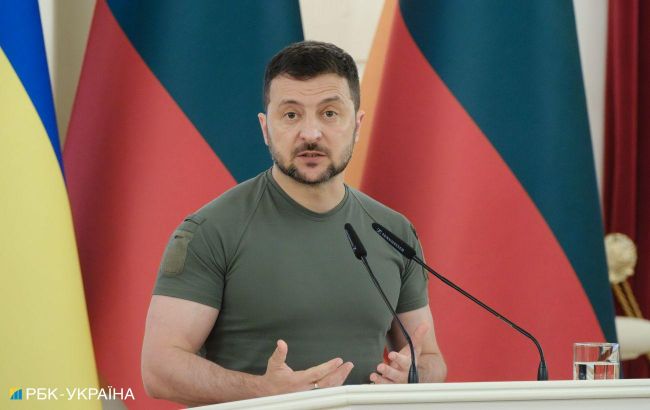Needed for EU: Zelenskyy demands law on e-declarations, MPs in favor but with conditions
 President of Ukraine Volodymyr Zelenskyy (Photo: Vitalii Nosach- RBC-Ukraine)
President of Ukraine Volodymyr Zelenskyy (Photo: Vitalii Nosach- RBC-Ukraine)
In Ukraine, due to the imposition of martial law amid the war with Russia, mandatory e-declarations for government officials and civil servants have been canceled. However, President Volodymyr Zelenskyy demands the adoption of a law that is one of the criteria for Ukraine's entry into the European Union.
In June of this year, Ukraine was granted candidate status for EU membership. However, to begin negotiations, Kyiv must fulfill seven recommendations from the European Commission, including the reinstatement of electronic asset declarations.
Yesterday, President Volodymyr Zelenskyy, in his traditional evening address, called on members of parliament to pass three laws for Ukraine's entry into the bloc.
"Ukraine has to achieve several very specific results in the coming month. In particular, it's our strategic political goal to launch membership negotiations with the European Union. Ukraine has seven specific recommendations from the European Commission. We have already implemented some of them. The other part requires the effective work of the Verkhovna Rada of Ukraine (Ukrainian Parliament - Ed.). Timely work, which we have agreed with the European Commission. The law on restoration of electronic declaration, amendments on the law of national minorities, and, I would like to draw special attention to it, the law on PEPs - politically exposed persons," the head of state said.
Recommendations from the National Agency on Corruption Prevention (NACP) on e-declarations
At the end of July, the Ukrainian Parliament supported in the first reading draft law No. 9534, which reinstates electronic asset declarations for officials. However, the second reading did not take place as the document requires some amendments.
In particular, the NACP insists that the document should not distort the institution of declaring as the "most systemic tool for ensuring the integrity of public servants. At the same time, the agency emphasizes that the draft law must take into account all security aspects related to martial law.
The document stipulates that only the use of real estate with a market value exceeding 50 living wages during the reporting period should be declared. Therefore, the NACP emphasizes that there are risks of abuse in declarations under this provision, which may lead to the non-declaration of such property and evasion of criminal liability.
Conditions of the Anti-Corruption Committee of the Parliament
In turn, the Committee of the Parliament on Anti-Corruption Policy has decided that e-declarations should remain as they were before the war. However, the declarations should not be made public for a year after submission. The committee also emphasizes that military personnel may not have to declare their assets.
Yaroslav Yurchyshyn, the First Deputy Chairman of the Committee on Anti-Corruption Policy, told RBC-Ukraine that declarations would primarily be available to the National Anti-Corruption Bureau (NABU) and the National Agency on Corruption Prevention (NACP).
"Declarations will be submitted, they will be in the system, NABU and NACP will have all the opportunities to check them, but they will become public within a year. There is a system where a person can apply to NACP to make the declaration public earlier, but it is no longer mandatory, it's optional," he said.
Yurchyshyn emphasizes that most members of the anti-corruption committee did not support public declarations during wartime.
"What problem will this create? Access for journalists and activists will be restricted. There are amendments that provide for public declarations during peacetime, and they will be put to a vote, but considering that the majority of the committee did not support such a level of publicity, and voted for a one-year delay in public disclosure, I think there are slim chances it will pass in the parliament. What it means is that the declaration will be available to law enforcement agencies, which is a step forward, but for restoring trust in government institutions, this is a significant blow," he noted.
The Deputy Chairman of the Anti-Corruption Committee in the Parliament also mentions that most officials do not want their assets to be publicly disclosed.
"It's uncomfortable, it's not the case in many European countries. But again, we were elected on the condition of public declaration, we knew what we were getting into. So, in principle, it's a choice between personal comfort and public trust. Unfortunately, the majority chooses personal comfort," he added.
However, the Chairwoman of the Anti-Corruption Committee of the Parliament, Anastasia Radina, added an amendment to make declarations public immediately.
What to expect after the second reading
If the document is passed in the second reading, e-declarations will be reinstated within 90 days from the date the law comes into force.
In addition, the declarations register will be reopened, but with certain exceptions. This includes the concealment of place of residence, which is entirely justified, unlike the concealment of the names of all family members and third parties - most of them have already been mentioned in previous declarations.
Therefore, the adoption of this law will not significantly change the lives of law-abiding MPs, and for Ukraine, it will be a significant step towards starting negotiations for EU accession by the end of this year.

